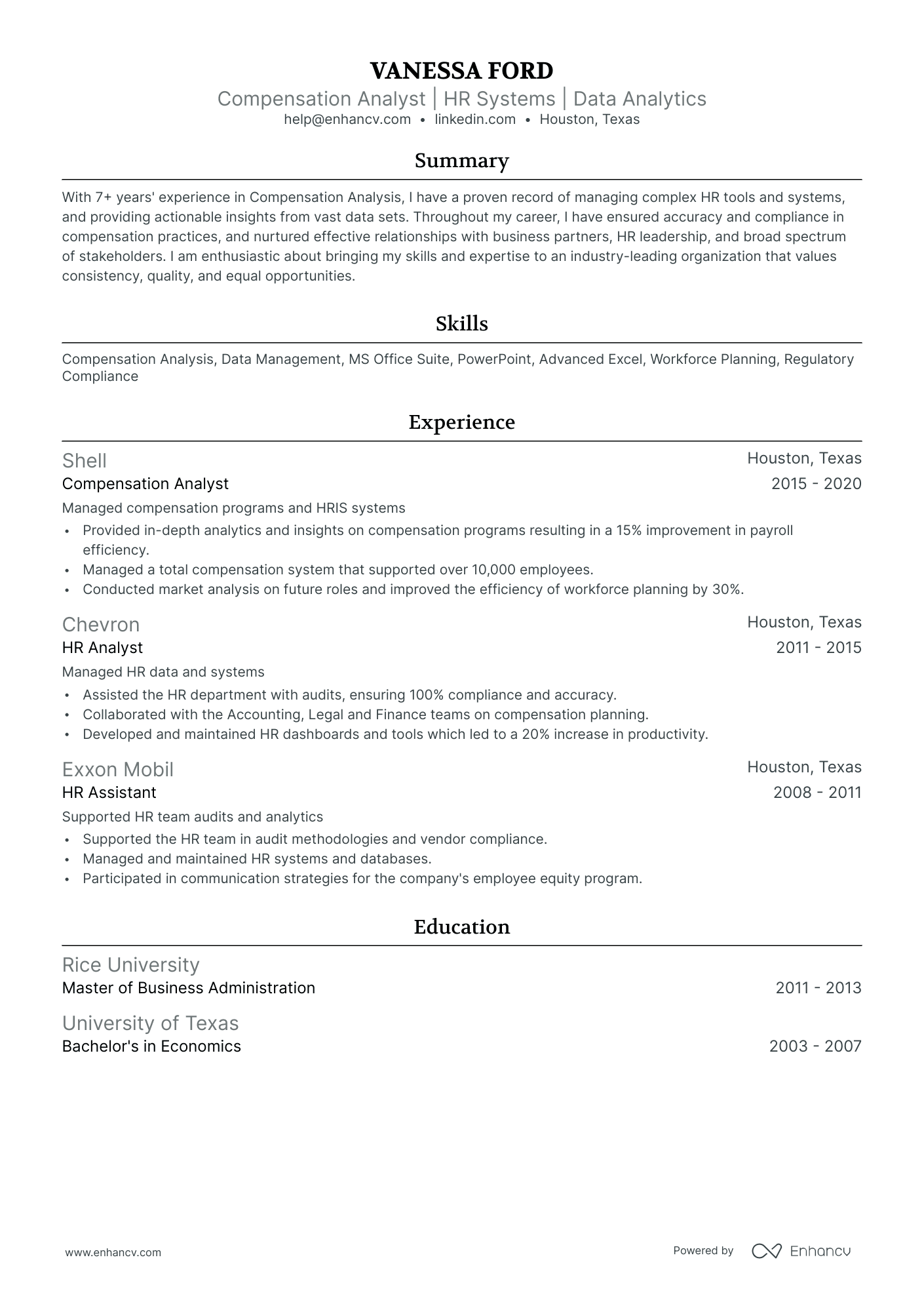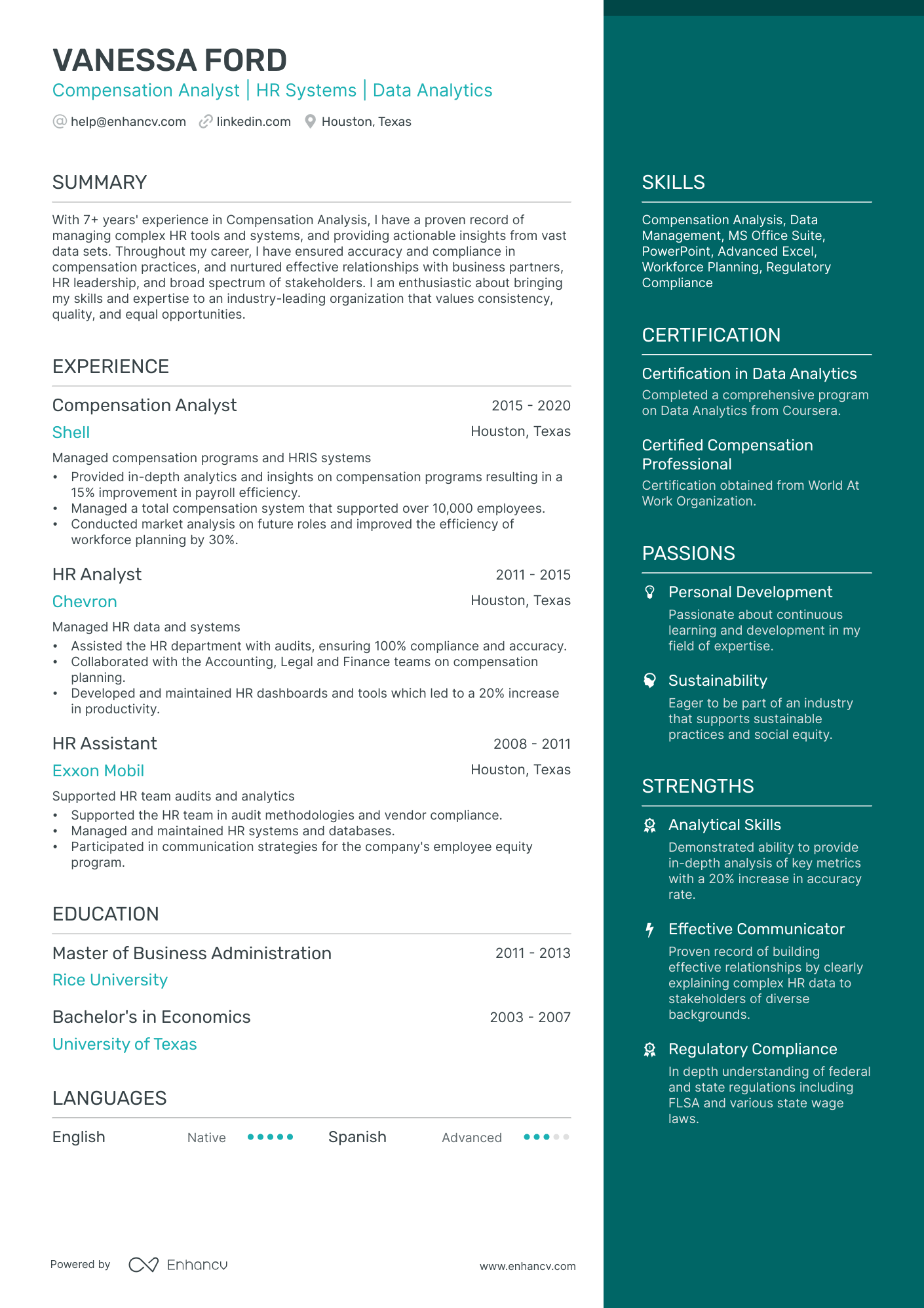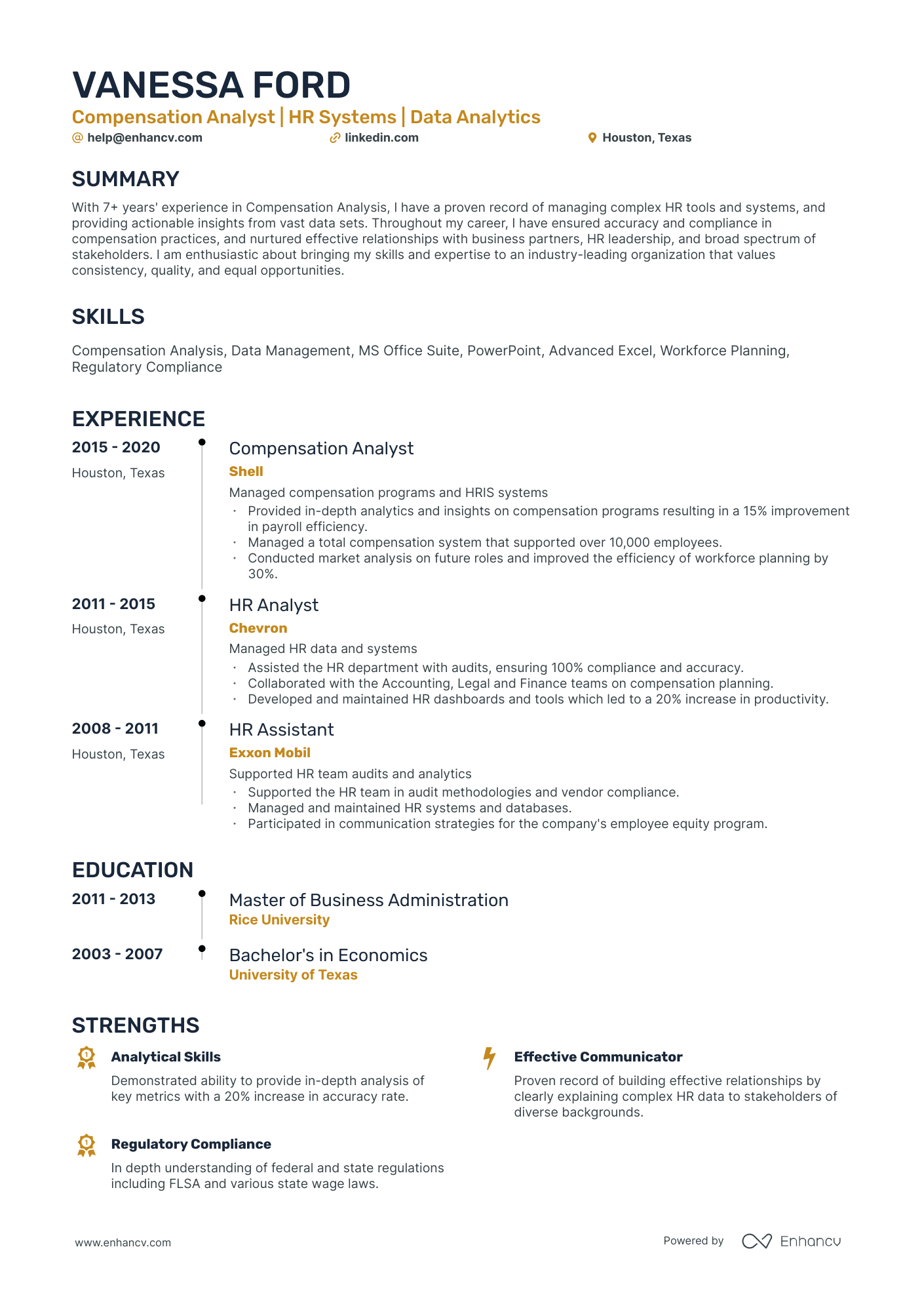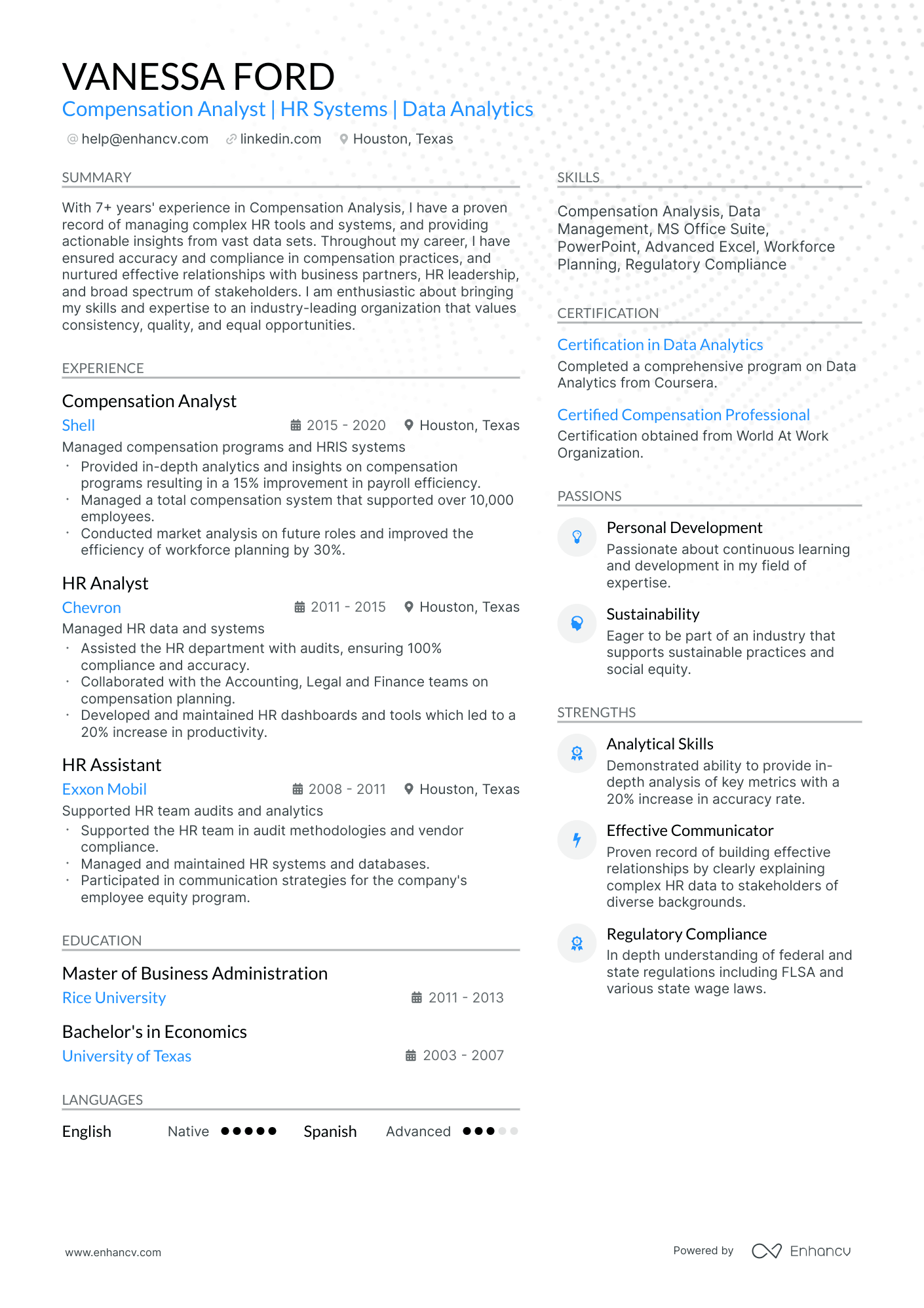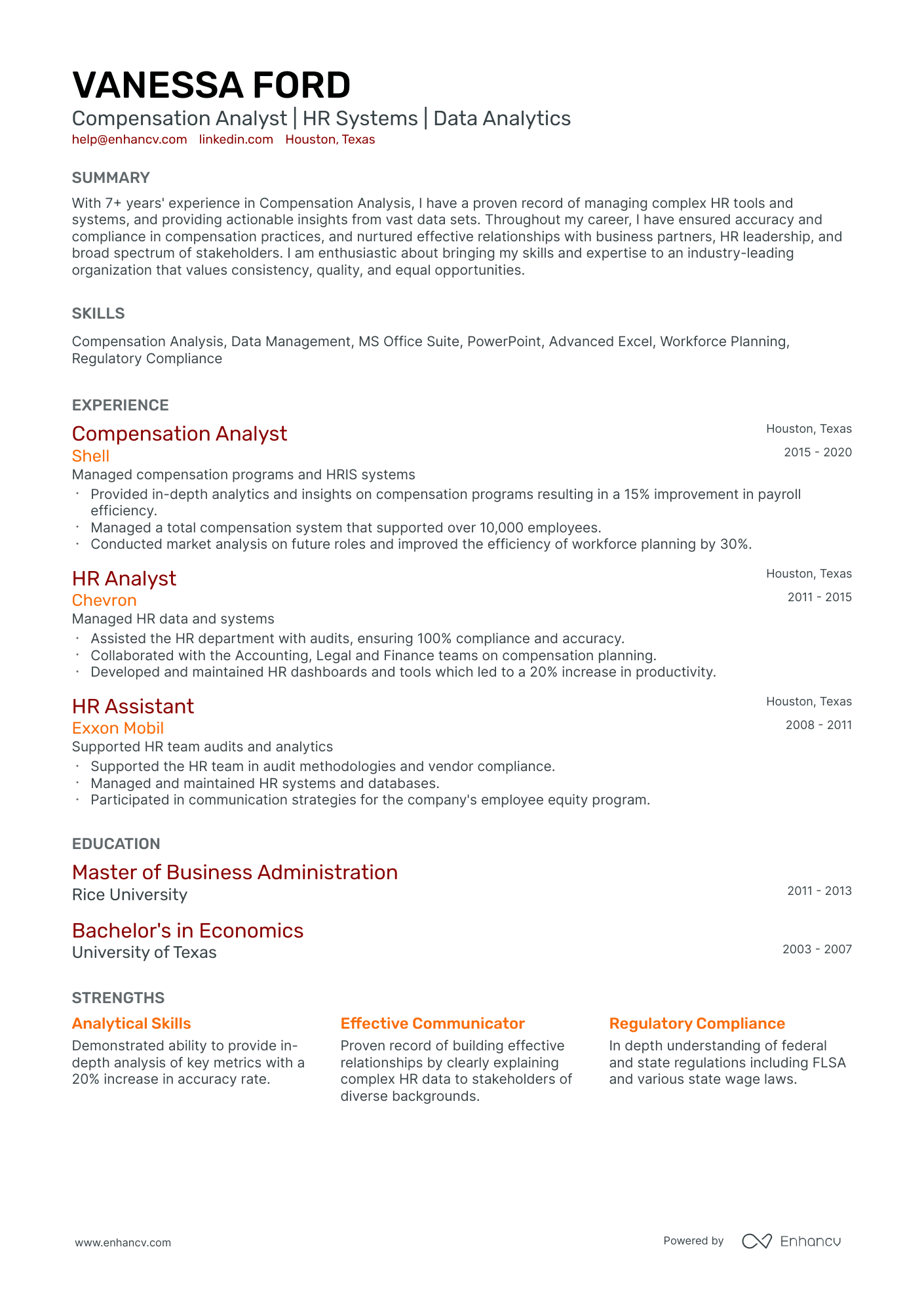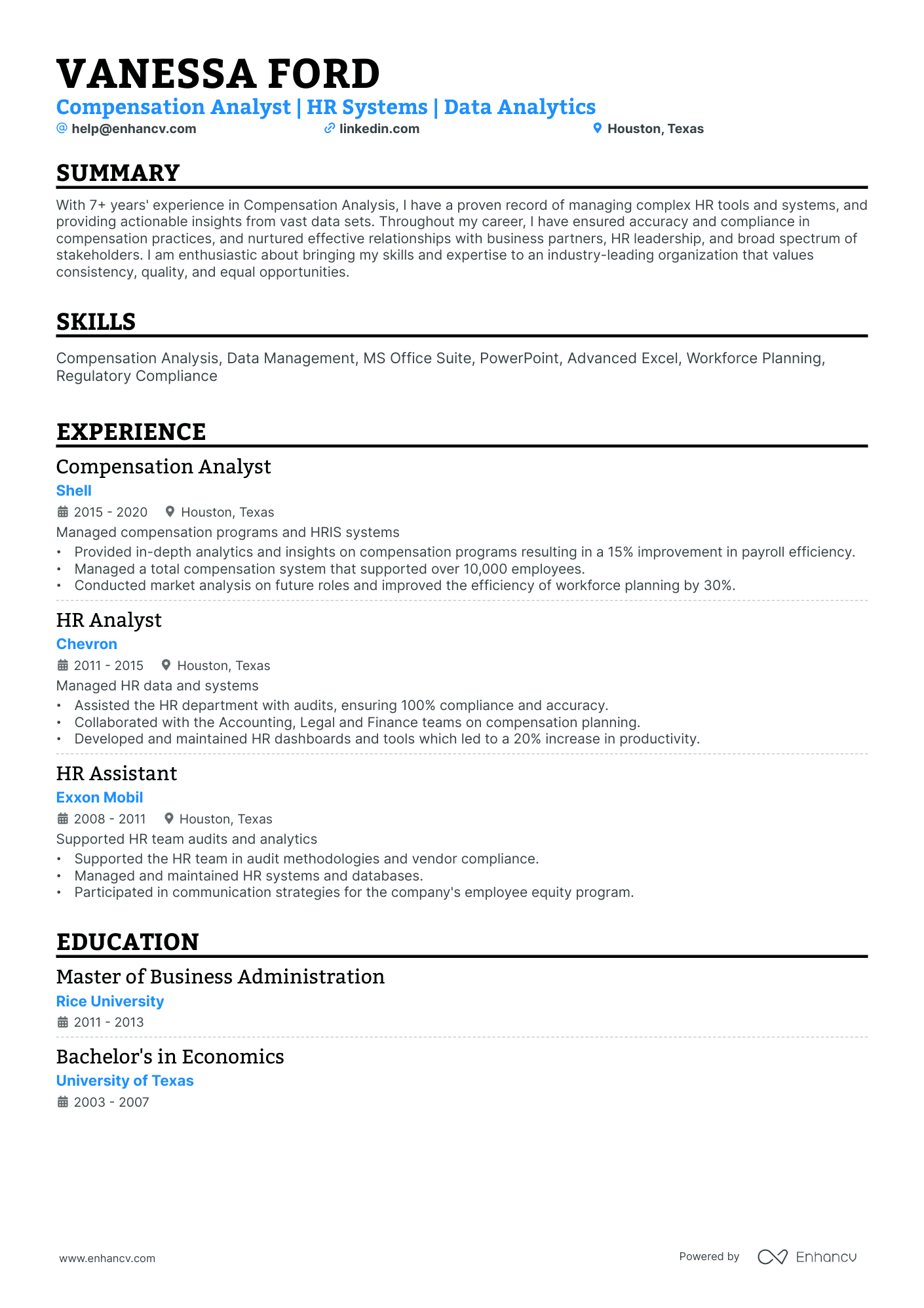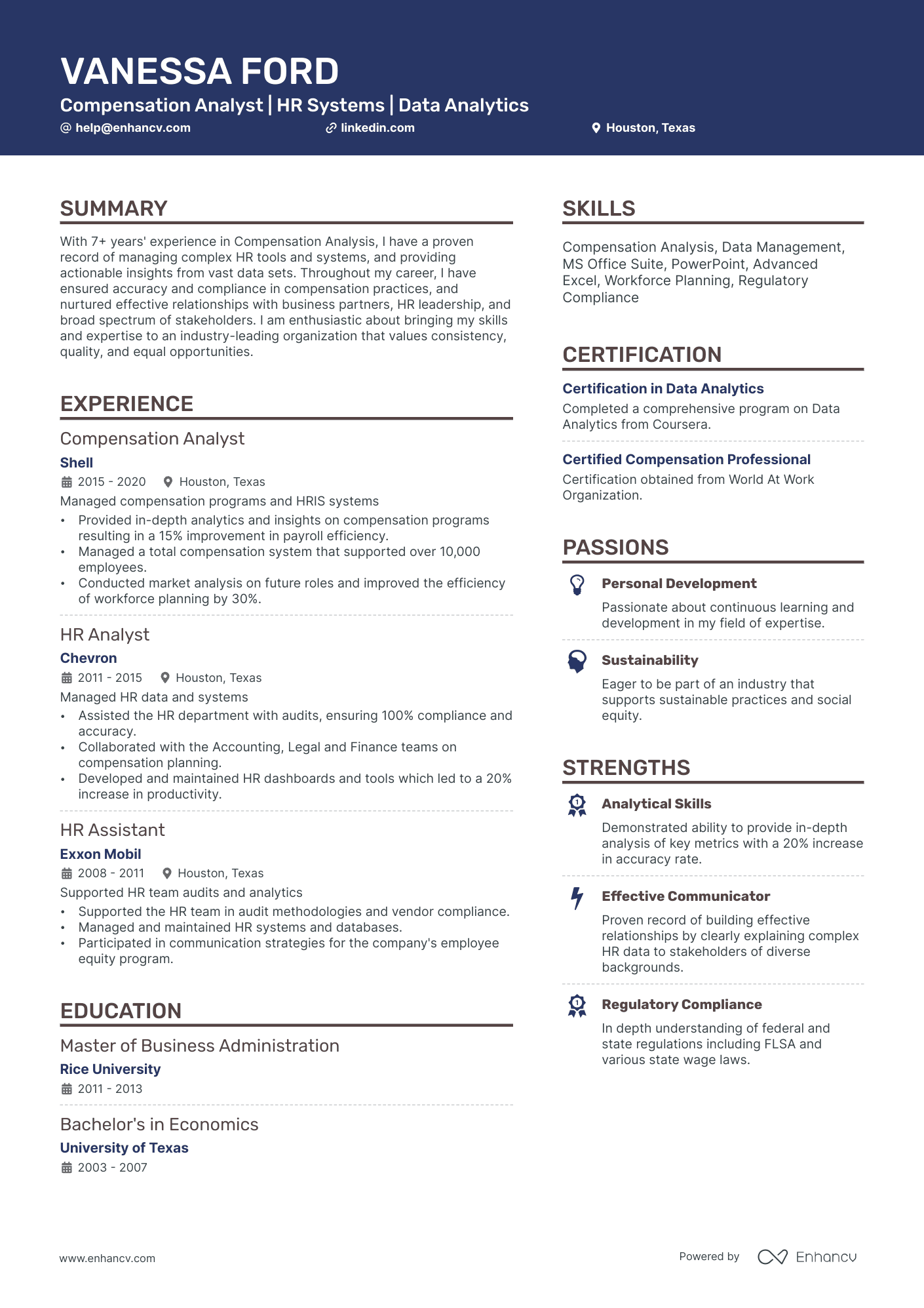Compensation analysts often struggle with demonstrating their analytical skills and experiences in a concise yet impactful manner on their resumes. Our guide provides clear advice on how to effectively quantify accomplishments, tailor your resume to highlight relevant skills such as data analysis and market research, and use specific examples that demonstrate your ability to develop and implement competitive compensation strategies.
Dive into this guide to learn how to craft a compensation analyst resume that offers recruiters a clear view of your career journey:
- Draw from our compensation analyst resume samples, highlighting top skills, certifications, and more.
- Illuminate the potential impact you can bring to an organization through your resume summary and experience.
- Spotlight your unique compensation analyst expertise, emphasizing tangible results and standout achievements.
Recommended reads:
Formatting the layout of your compensation analyst resume: design, length, and more
When it comes to the format of your compensation analyst resume , you've plenty of opportunities to get creative. But, as a general rule of thumb, there are four simple steps you could integrate into your resume layout.
- If you have plenty of experience, you'd like to showcase, invest in the reverse-chronological resume format. This format focuses on your latest experience items and skills you've learned during your relevant (and recent) jobs.
- Don't go over the two-page limit, when creating your professional compensation analyst resume. Curate within it mainly experience and skills that are relevant to the job.
- Make sure your compensation analyst resume header includes all of your valid contact information. You could also opt to display your professional portfolio or LinkedIn profile.
- Submit or send out your compensation analyst resume as a PDF, so you won't lose its layout and design.
Adjust your resume layout based on the market – Canadian resumes, for example, may follow a unique format.
Upload your resume
Drop your resume here or choose a file. PDF & DOCX only. Max 2MB file size.
Pro tip
Choose a functional resume template that offers ample space to showcase your unique compensation analyst expertise.
Don't forget to include these six sections on your compensation analyst resume:
- A header for your contact details and a summary that highlight your alignment with the compensation analyst job you're applying for
- An experience section that explains how you apply your technical and personal skills to deliver successful results
- A skills section that further highlights how your profile matches the job requirements
- An education section that provides your academic background
- An achievements' section that mentions any career highlights that may be impressive, or that you might have missed so far in other resume sections
What recruiters want to see on your resume:
- Data Analysis Skills: Proficiency in using tools such as Excel or specialized HR software to analyze data and make compensation recommendations.
- Knowledge of Compensation Structures: Understanding of base pay, incentive pay, benefits, and total compensation packages to accurately evaluate positions and ensure internal equity.
- Legal Compliance Knowledge: Up-to-date knowledge about federal, state, and local compensation laws and regulations to ensure organizational compliance.
- Experience with Job Evaluation: Ability to assess jobs and roles within the organization to determine their relative value and classify them accordingly.
- Communication Skills: Ability to clearly present compensation recommendations to management and explain compensation plans to employees.
Recommended reads:
Decoding the compensation analyst resume experience section
Once you've settled on your resume's format, the next step is detailing your professional journey.
Many compensation analyst professionals grapple with this section, especially when balancing between extensive or limited experience. Here's a roadmap to navigate this:
- Limit bullet points under each job role to six, focusing on high-impact contributions.
- Highlight achievements that resonate with the job's requirements, rather than just listing duties.
- Detail any on-the-job certifications or skills acquired and their relevance to your growth.
- Choose impactful verbs for each bullet, avoiding overused terms like "managed".
- Infuse relevant keywords from the job posting, especially in the context of accomplishments.
For more insights, explore these curated examples from seasoned compensation analyst professionals:
- Conducted comprehensive compensation analysis for a Fortune 500 company, evaluating salary structures and proposing adjustments resulting in a 10% decrease in turnover rate.
- Developed and implemented a performance-based incentive program that increased employee productivity by 15% within the first year of implementation.
- Collaborated with HR teams to conduct market research and benchmarking, ensuring competitive compensation packages to attract top talent.
- Led the annual salary review process, analyzing market trends and internal data to recommend salary adjustments resulting in a 7% increase in overall employee satisfaction.
- Utilized advanced Excel functions and statistical models to create detailed compensation reports and presentations for executive leadership.
- Managed job classification and leveling processes, ensuring consistency and compliance across the organization.
- Administered the company's equity compensation programs, including stock options and restricted stock units (RSUs), resulting in improved retention of key employees.
- Reviewed and updated compensation policies and procedures to ensure alignment with industry best practices and legal requirements.
- Supported the design and implementation of variable pay plans, resulting in a 20% increase in sales team motivation and performance.
- Conducted regression analyses to identify factors impacting employee turnover and made recommendations to reduce attrition rates.
- Assisted in the development and maintenance of the company's job description library, ensuring accuracy and adherence to industry standards.
- Conducted salary surveys and analyzed compensation data to support competitive pay recommendations.
- Assessed the impact of minimum wage laws and market trends on entry-level positions, resulting in adjustments that improved overall workforce satisfaction.
- Collaborated with finance teams to develop budget projections for annual salary increases and bonus payouts.
- Assisted in the implementation of a new HRIS system for streamlined compensation management.
- Conducted internal equity analyses to identify and resolve pay disparities across various departments and job levels.
- Supported the development of sales commission plans and provided ongoing analysis to ensure alignment with business goals.
- Assisted in the administration of employee benefits programs, including health insurance and retirement plans.
- Participated in salary surveys and analyzed market data to maintain competitiveness in attracting and retaining talent.
- Assisted in the design and delivery of compensation training programs for managers and HR professionals.
- Led the evaluation of executive compensation packages, ensuring alignment with corporate strategy and market competitiveness.
- Developed and maintained comprehensive compensation metrics and dashboards for regular reporting to senior leadership.
- Partnered with cross-functional teams to support the design and implementation of a new total rewards program.
- Conducted in-depth statistical analyses to identify pay gaps and recommend corrective actions resulting in improved pay equity.
- Provided guidance and expertise on compensation-related matters, including job offers, promotions, and internal transfers.
- Collaborated with finance teams to develop annual budgets for compensation and benefits programs.
- Conducted cost analyses of proposed salary adjustments and incentive plans to ensure financial feasibility.
- Supported the implementation of a new HRIS system, leading data migration and testing efforts.
- Developed and delivered training sessions to educate managers on compensation policies and procedures.
- Performed job evaluations and market pricing analysis to establish competitive salary ranges.
- Managed the administration of the company's executive compensation programs, including equity grants and performance-based incentives.
- Provided guidance and support to HR business partners and managers on compensation-related matters.
- Conducted comprehensive benchmarking analyses to ensure market competitiveness of salary structures.
- Reviewed and revised sales commission plans to align with revenue goals and motivate the sales team.
- Collaborated with legal teams to ensure compliance with federal and state regulations related to compensation.
- Analyzed salary survey data to determine market trends and make recommendations for annual salary adjustments.
- Participated in the design and implementation of a job evaluation system to ensure internal equity.
- Developed and maintained compensation-related policies, ensuring compliance with legal requirements.
- Conducted ad hoc analyses to support the resolution of compensation-related issues and inquiries.
- Assisted in the development and delivery of total rewards communication materials.
- Assisted in the design and implementation of an automated salary survey platform for data collection and analysis.
- Reviewed and processed employee position change requests, ensuring accurate job classification and compensation adjustments.
- Conducted market research on emerging compensation practices to support the development of innovative reward programs.
- Participated in annual salary surveys, analyzing data to provide recommendations for salary ranges and adjustments.
- Collaborated with HR teams to conduct equity analyses and resolve pay disparities across the organization.
- Administered the company's executive compensation programs, including equity grants and deferred compensation plans.
- Conducted comprehensive analysis of sales incentive plans, resulting in improved alignment with business objectives.
- Analyzed workforce demographics and made recommendations to enhance diversity and inclusion within compensation structures.
- Collaborated with external consultants to conduct market benchmarking and develop competitive salary ranges.
- Supported the implementation of a new compensation management software system, ensuring data accuracy and system functionality.
The following content includes information from "O*NET OnLine" by the U.S. Department of Labor, Employment and Training Administration (USDOL/ETA). Used under the CC BY 4.0 license. The data represents the top responsibilities present on the task lists for compensation analyst professionals.
Top Responsibilities for Compensation Analyst:
- Administer employee insurance, pension, and savings plans, working with insurance brokers and plan carriers.
- Ensure company compliance with federal and state laws, including reporting requirements.
- Research employee benefit and health and safety practices, and recommend changes or modifications to existing policies.
- Advise managers and employees on state and federal employment regulations, collective agreements, benefit and compensation policies, personnel procedures, and classification programs.
- Plan and develop curricula and materials for training programs and conduct training.
- Assist in preparing and maintaining personnel records and handbooks.
- Develop and administer compensation programs, such as merit or incentive pay.
- Evaluate job positions, determining classification, exempt or non-exempt status, and salary.
- Prepare occupational classifications, job descriptions, and salary scales.
- Consult with, or serve as, technical liaison between business, industry, government, and union officials.
Quantifying impact on your resume
<ul>
Strategies for candidates with limited resume experience
Lack of extensive experience doesn't mean you can't make a strong impression. Here's how:
- Thoroughly understand the role's requirements and reflect them in key resume sections.
- Highlight transferable skills and personal attributes that make you a valuable candidate.
- Use the resume objective to articulate your growth vision within the company.
- Emphasize technical alignment through relevant certifications, education, and skills.
Remember, your resume's primary goal is to showcase how you align with the ideal candidate profile. The closer you match the job requirements, the higher your chances of securing an interview.
Recommended reads:
Pro tip
Highlight what sets your experience apart. Incorporate metrics, feedback, and the tangible value you've added to organizations. This specificity ensures your resume remains pertinent and memorable.
Highlighting essential hard and soft skills for your compensation analyst resume
Your skill set is a cornerstone of your compensation analyst resume.
Recruiters keenly evaluate:
- Your hard skills, gauging your proficiency with specific tools and technologies.
- Your soft skills, assessing your interpersonal abilities and adaptability.
A well-rounded candidate showcases a harmonious blend of both hard and soft skills, especially in a dedicated skills section.
When crafting your compensation analyst skills section:
- List up to six skills that resonate with the job requirements and highlight your expertise.
- Feature a soft skill that encapsulates your professional persona, drawing from past feedback or personal reflections.
- Consider organizing your skills into distinct categories, such as "Technical Skills" or "Soft Skills."
- If you possess pivotal industry certifications, spotlight them within this section.
Crafting a comprehensive skills section can be daunting. To assist, we've curated lists of both hard and soft skills to streamline your resume-building process.
Top skills for your compensation analyst resume:
Compensation Management Software
Excel
Data Analysis Tools
HRIS Systems
Statistical Analysis Software
Salary Benchmarking Tools
Reporting Software
Payroll Systems
Database Management
Job Evaluation Methods
Analytical Thinking
Attention to Detail
Communication Skills
Problem-Solving
Interpersonal Skills
Time Management
Adaptability
Team Collaboration
Critical Thinking
Confidentiality
Next, you will find information on the top technologies for compensation analyst professonals from "O*NET OnLine" by the U.S. Department of Labor, Employment and Training Administration (USDOL/ETA). Used under the CC BY 4.0 license.
Top technologies for Compensation Analyst’s resume:
- Oracle PeopleSoft
- Workday software
- Microsoft PowerPoint
- Human resource management software HRMS
- Oracle E-Business Suite Human Resources Management System
Pro tip
When detailing your skills, align them with the job's requirements. Emphasize unique technical proficiencies and provide examples of your soft skills in action.
Highlighting certifications and education on your compensation analyst resume
Your academic achievements, including certifications and degrees, bolster your application. They showcase your skills and commitment to the field.
To effectively present these on your resume:
- Highlight significant academic achievements or recognitions relevant to the role.
- Be selective; prioritize the most relevant and impressive certifications.
- Include essential details: certificate/degree name, institution, graduation dates, and license numbers (if applicable).
- Present your academic background in reverse chronological order, emphasizing the most recent and relevant qualifications.
For further guidance, explore popular industry certifications.
Best certifications to list on your resume
Pro tip
If you have basic certificates, place them in the skills or experience section. This saves space for high-demand industry certificates.
Recommended reads:
Choosing the right compensation analyst resume summary or objective
The top section of your resume is pivotal. It should encapsulate your alignment with the job, your unique skill set, and your professional expertise.
Both the resume summary and resume objective can serve this purpose:
- Use the resume objective to spotlight your current achievements and future aspirations. Highlight how you envision your growth in the prospective role.
- Opt for the resume summary to succinctly present your most relevant professional highlights. Aim for brevity, ideally within five sentences.
Ultimately, these sections offer a glimpse into your professional persona and the unique value you bring.
Resume summary and objective examples for a compensation analyst resume
Optimize your resume summary and objective for ATS
Drop your resume here or choose a file.
PDF & DOCX only. Max 2MB file size.
Four additional sections to consider for your compensation analyst resume
To give a fuller picture of who you are, consider adding these sections to your compensation analyst resume:
- Awards - to showcase your achievements.
- Interests - to share passions outside of work.
- Publications - to highlight your contributions to the field.
- Projects - to spotlight significant accomplishments, even those outside of traditional work settings.
Key takeaways
- Pay special attention to the tiny details that make up your compensation analyst resume formatting: the more tailored your application to the role is, the better your chances at success would be;
- Select the sections you include (summary or objective, etc.) and formatting (reverse-chronological, hybrid, etc.) based on your experience level;
- Select experience items and, consequently, achievements that showcase you in the best light and are relevant to the job;
- Your profile will be assessed both based on your technical capabilities and personality skills - curate those through your resume;
- Certifications and education showcase your dedication to the particular industry.

